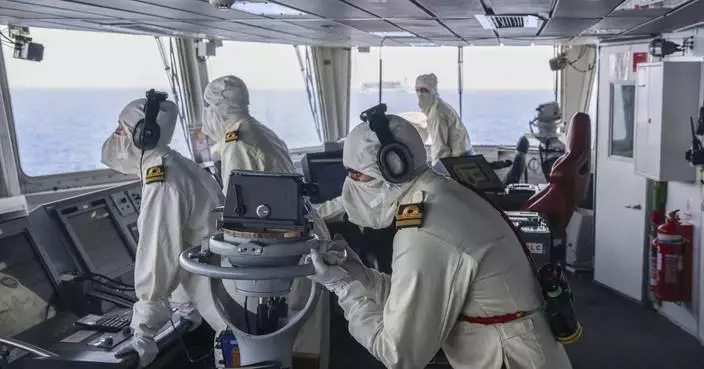The U.S. on Tuesday urged Yemen’s rebels to halt their attack on the central province of Marib, warning against exacerbating the humanitarian crisis in the Arab world's poorest country.
State Department spokesperson Ned Price said in a statement the Houthis’ attack on Marib, which is held by the rival internationally recognized government, was “the action of a group not committed to peace or to ending the war afflicting the people of Yemen."
Yemen’s war started in 2014 when the Iran-backed Houthis seized the capital, Sanaa, and much of the country’s north. A Saudi-led, U.S.-backed coalition intervened months later to dislodge the rebels and restore the internationally recognized government. The conflict has killed some 130,000 people and spawned the world’s worst humanitarian disaster.
The rebels earlier this month renewed their attacks on the oil-rich province, an anti-Houthi stronghold. However, they have faced stiff resistance and have not made progress amid heavy air bombing from the Saudi-led coalition.
The latest bout of violence killed dozens of fighters, mostly among the Houthis, and sparked fears of a new humanitarian crisis.
Marib province, the location of the ancient Great Marib Dam, has served as a sort of haven for around 1 million Yemenis who have fled Houthi offensives since the start of the war, the State Department said, citing U.N. figures.
“An assault on the city would put two million civilians at risk, with hundreds of thousands potentially forced to flee — with unimaginable humanitarian consequences,” U.N. Humanitarian Chief Mark Lowcock tweeted Monday.
Price, the state department spokesperson, also called on the Houthis to stop their cross-border attacks on Saudi Arabia.
The rebels have recently intensified attacks using explosive-laden drones and missiles on the kingdom in an apparent attempt to pressure the Saudi-led coalition to stop its air campaign on the rebels in Marib and elsewhere in Yemen.
Price also urged the Houthis to engage “constructively” and “seriously” in efforts by envoys from the U.N. and the U.S. that aim to find a settlement to the conflict.
“The time to end this conflict is now. There is no military solution,” he said.
In an apparent response to the U.S. statement, Mohamed Abdel Salam, a Houthi spokesman, called for the Saudi-led coalition to end its campaign and lift the blockade on Houthi-held areas.
After that, “we are ready to engage positively,” he said.
UNITED NATIONS (AP) — The United States called on Iran on Monday to halt its transfer of an “unprecedented” amount of weaponry to Yemen’s Houthi rebels, enabling their fighters to carry out “reckless attacks” on ships in the Red Sea and elsewhere.
U.S. deputy ambassador Robert Wood told the U.N. Security Council that if it wants to make progress toward ending the civil war in Yemen, it should collectively “call Iran out for its destabilizing role and insist that it cannot hide behind the Houthis.”
He said there is extensive evidence that Iran is providing advanced weapons, including ballistic and cruise missiles, to the Houthis in violation of U.N. sanctions.
“To underscore the council’s concern regarding the ongoing violations of the arms embargo, we must do more to strengthen enforcement and deter sanctions violators,” Wood said.
The Houthis say their attacks on shipping in the Red Sea and Gulf of Aden are aimed at pressuring Israel to end its war with Hamas in Gaza, which has killed more than 35,000 Palestinians there. The war began after Hamas-led militants attacked Israel on Oct. 7, killing 1,200 people and taking some 250 others hostage.
The Houthis have launched more than 50 attacks on shipping, seized one vessel and sunk another since November, the U.S. Maritime Administration said late last month.
Houthi attacks have dropped in recent weeks as the rebels have been targeted by a U.S.-led airstrike campaign in Yemen. Shipping through the Red Sea and Gulf of Aden has declined because of the threat.
Hans Grundberg, the U.N. special envoy for Yemen, warned the council that “hostilities continue,” even though there has been a reduction in attacks on commercial and military vessels in the Red Sea, Gulf of Aden and the Indian Ocean, as well as a reduction in the number of U.S. and British airstrikes on targets in Yemen.
He pointed to an announcement by the Houthis that they will “expand the scope of attacks," calling this "a worrisome provocation in an already volatile situation.”
Russian Ambassador Vassily Nebenzia told the council that the Israeli announcement on May 6 that it was starting its military operation in Gaza’s southern city of Rafah, where 1.2 million Palestinians had sought safety, ratcheted up the spiral of escalation in the region “another notch further.”
“There’s no doubt that this will have an impact on the situation in Yemen’s surrounding waters,” he said, noting the Houthis’ opposition to Israeli attacks that harm Palestinian civilians.
“We call for a swift cessation of the shelling of commercial vessels and any other actions that hamper maritime navigation," Nebenzia added.
He sharply criticized the United States and its Western allies, saying their “totally unjustified aggressive strikes” in Yemen violate the U.N. Charter. He said they further complicate an already complex situation in the Red Sea.
The war between the Houthis and pro-government forces in Yemen backed by a coalition of Gulf Arab states has raged since 2014. The Houthis swept down from the mountains, seized much of northern Yemen and the country’s capital, Sanaa, and forced the internationally recognized government to flee into exile to Saudi Arabia. Since then, more than 150,000 people have been killed by the violence and 3 million have been displaced.
Fighting has decreased markedly in Yemen since a truce in April 2022, but there are still hotspots across the country.
Grundberg recalled that in December, the Houthis and the government “took a courageous step towards a peaceful solution” by agreeing to a series of commitments that would provide for a nationwide cease-fire, ensure desperately needed humanitarian aid, and initiate a political process to end the conflict.
However, U.N. humanitarian chief Martin Griffiths reported “alarmingly high” levels of severe food deprivation across the country that are expected to worsen during the lean season for crops, starting in June.
Griffiths also expressed serious concern about a rapidly worsening cholera outbreak. He cited reports of 40,000 suspected cholera cases and over 160 deaths — “a sharp increase” since last month, the majority in Houthi-controlled areas “where hundreds of new cases are reported every day.”

A Houthi soldier stands alert in front of the Israeli Galaxy ship which was seized by the Houthis, in the port of Saleef, near Hodeidah, Yemen, Sunday, May 12, 2024. (AP Photo/Osamah Abdulrahman)

A Houthi soldier stands on board of the Israeli Galaxy ship which was seized by the Houthis, in the port of Saleef, near Hodeidah, Yemen, Sunday, May. 12, 2024. (AP Photo/Osamah Abdulrahman)











